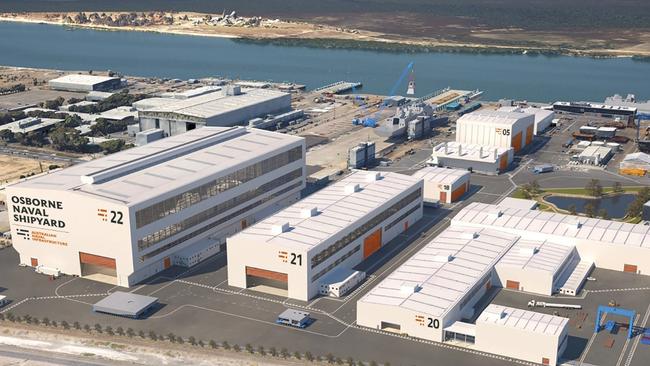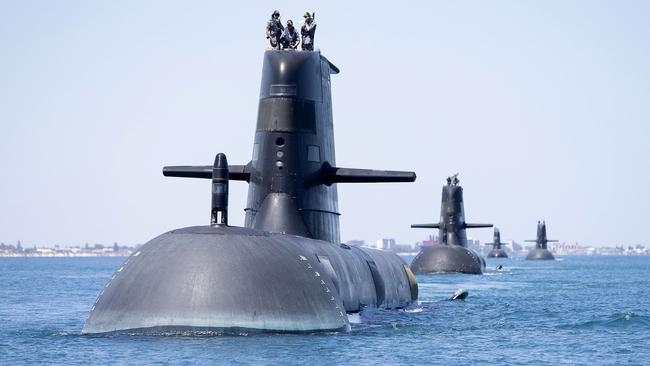Hundreds of SA businesses in the submarine supply chain in the firing line
As governments in South Australia and Western Australia make their arguments to maintain the Collins Class submarines, Senate answers have revealed the huge value of the work.
- WA versus SA on submarines jobs
- Centre Alliance warns submarine jobs could go West
- Report highlights challenges to create enough shipbuilders
- No minimum requirements for SA jobs on submarine programs
Almost 800 businesses will be affected and a further $400 million in economic activity could be lost each year if a submarine maintenance program goes to Western Australia, new documents show.
As State Governments in South Australia and Western Australia pledge their cases for the future maintenance of Collins Class submarines, answers provided to the Senate have laid bare the huge value of the work. The answers show Adelaide defence shipbuilder ASC has engaged 793 South Australian-based businesses in the submarine supply chain in the past three years.
All of these contracts contribute directly or indirectly to submarine maintenance.
ASC spent more than $175 million with those companies in the past three years.
The answers also show ASC is recording about $800 million in revenue each year - half of which could be easily attributed to Adelaide.

The figures have prompted calls from Centre Alliance Senator Rex Patrick, who asked the questions, and Business SA for a co-ordinated response from SA to ensure the maintenance work does not go west.
The calls have intensified with a new Federal Government review to be handed down in months detailing the best location for future submarine maintenance work.
The WA State Government has launched a campaign aimed at convincing the Federal Government that ASC’s Henderson shipyards, near Fremantle, is the best location for the lucrative contract.
The elevation of WA federal MPs Linda Reynolds and Melissa Price to the Defence and Defence Industry portfolios, respectively, has further raised local concerns. WA’s Defence Issues Minister, Paul Papalia, last month confirmed this week that “securing sustainment” of Australia’s submarines and frigates was a key objective of his government.
Ms Reynolds and fellow West Australian, Mathias Cormann, who is a senior party powerbroker and the Federal Finance Minster, both stressed yesterday no decision had been made on the contract.
Senator Patrick told The Advertiser the answers provide an understanding of the importance of retaining submarine full cycle docking work in Adelaide. “The answers show the devastating effect the move will have on local businesses,” he said.
“There are almost 800 business and their employees that rely on ASC for work.”

Business SA executive director of industry and government engagement Anthony Penney said one of the main issues that SA has faced in defence is the lack of a continuous pipeline of work, enabling the retention of a skilled worker base.
“Keeping as many jobs as possible in South Australia will ensure there is a skills base for any future projects,” he said.
“A co-ordinated approach by all stakeholders should be high on the agenda to protect this vital industry in this state.”
Ms Reynolds said the government was considering its arrangement for both the acquisition of new ships and submarines, alongside the ongoing need to sustain the Navy’s fleet now and into the future.
“Given the importance of the Naval Shipbuilding Plan to our national security, we need to take the necessary steps to get this ambitious plan right.
“All decisions will be taken in the national interest.”
Ms Reynolds said expert advice has been requested to evaluate the options for full cycle docking.
“This advice will be carefully considered before any decisions are made.
“While these options are being analysed, it is premature and irresponsible to make unsubstantiated claims on the possible implications.”
A $3.5 billion, 25-year contract for the Collins Class submarines’ full-cycle docking was inked in October, 2003, by the-then defence minister Robert Hill and finance minister Nick Minchin – both SA senators.
Senior Liberals have told The Advertiser the presumption at the time was the work would be done in Adelaide for the duration of the contract.
Under the terms of the agreement, the initial duration was for 15 years (until 2018), with an option to extend for a further 10 years.
One senior Liberal said there had been an expectation that the work would shift to Western Australia but Prime Minister Scott Morrison now was believed to be keen on honouring the original agreement.
This involved half-cycle dockings, or minor services, being done in WA, and the full-cycle dockings being done at Osborne’s naval shipyard.
Conducted every six to seven years for each boat, the overhauls involve taking the submarines out of the water into dry-dock, pulling them apart and replacing all key components.
